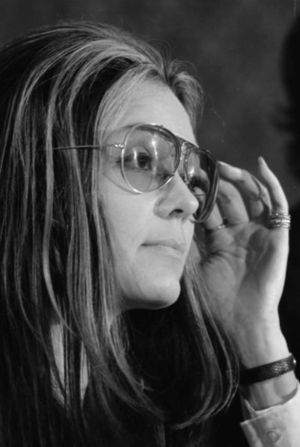Gloria Steinem
Gloria Steinem (b. ✦March 25, 1934 is an American feminist icon, journalist, and women's rights advocate. She is the founder and original publisher of Ms. magazine.
Early life
Gloria Marie Steinem was born in Toledo, Ohio. Her mother, Ruth, was of part German descent. Her Jewish-American father, Leo Steinem, was a traveling antique dealer (with trailer and family in tow). The family split in 1944 when he went to California to find work while Gloria lived with her mother in Toledo. As a child in Toledo, she cared for her ill mother and helped support the family.
Education and early career
Steinem entered Smith College on scholarship in 1952, majoring in government studies and becoming politically active in Adlai Stevenson's presidential campaign. She was elected to Phi Beta Kappa Society (the oldest honor society in the United States) in 1956, the year she graduated. She studied in India for two years, after which she returned to America, where she believed that she had difficulty finding a journalism position because males had hiring preference. In 1960, she became assistant editor of Help! magazine and a freelance writer, and in 1963, started freelancing full-time with the publication of her controversial undercover article, A Bunny's Tale: "Show's" First Exposé for Intelligent People. Also in the mid-'60s she was a contributor to NBC-TV's groundbreaking satirical program, That Was the Week That Was (TW3), where she wrote a recurring segment called "Surrealism in Everyday Life."
Political awakening and activism
After conducting a series of celebrity interviews, Steinem eventually got a political assignment covering George McGovern's presidential campaign, which led to a position in a New York magazine. She became politically active in the feminist movement, and the media seemed to appoint Steinem as a feminist leader of sorts. Steinem brought other notable feminists to the fore and toured the country with lawyer Florynce Rae ("Flo") Kennedy, and in 1971, cofounded the National Women's Political Caucus as well as the Women's Action Alliance. In 1972, she helped start the feminist Ms. magazine and wrote for the magazine until it was sold in 1987. The magazine was bought by the Feminist Majority Foundation in 2001, and Steinem remains on the masthead as one of six founding editors and serves on the advisory board.
Steinem cofounded the Coalition of Labor Union Women in 1974, and participated in the National Conference of Women in Houston, Texas in 1977. She became Ms. magazine's consulting editor when it was revived in 1991, and she was inducted into the National Women's Hall of Fame in 1993.
Later life
In the 1980s and 1990s, Steinem had to deal with a number of personal setbacks, including the diagnoses of breast cancer in 1986,[1] and trigeminal neuralgia in 1994.
According to two PBS Frontline features (aired in 1995) and Ms. magazine, Steinem became an advocate for children she believed had been sexually abused by caretakers in day care centers (such as the McMartin preschool case).[2][3][4]
On September 3, 2000, at age 66, she married David Bale, father of actor Christian Bale. The wedding was performed at the home of her friend Wilma Mankiller, formerly the first female Tribal chief of the Cherokee Nation. Steinem's marriage gained much publicity, not only due to her semi-celebrity status, but also because Steinem had once famously quipped, "A woman without a man is like a fish without a bicycle." Steinem and Bale were married for only three years before he died of brain lymphoma on December 30, 2003, at age 62. In 2005, Steinem appeared in the documentary film, I Had an Abortion, by Jennifer Baumgardner and Gillian Aldrich. In the film, Steinem described the abortion she received as a young woman in London, where she lived briefly before studying in India. Steinem is also a member of Democratic Socialists of America, and an advisory board member of Women's Voices. Women Vote.
Canadian singer-songwriter David Usher penned a song entitled Love Will Save The Day, which includes sound bites from Steinem speeches. The song's opening contains her statement, "It really is a revolution", and the ending breaks for the quote, "We are talking about a society in which there will be no roles other than those chosen or those earned; we are really talking about humanism." In the credits of the movie V For Vendetta, this last speech is also quoted.
List of works
- The Beach Book (1963)
- Outrageous Acts and Everyday Rebellions (1983)
- Marilyn: Norma Jean (1986)
- Revolution from Within (1992)
- Moving beyond Words (1993)
See also
External links
- 1983 audio interview of Gloria Steinem by Don Swaim of CBS Radio, RealAudio
- Gloria Steinem discusses “After Black Power, Women’s Liberation"
- Jewish Women and the Feminist Revolution from the Jewish Women's Archive
- The Redstockings expose Gloria Steinem
- Gloria Steinem Biography from Thomson Gale
- The Gloria Steinem Papers at Smith College
- Gloria Steinem and the CIA-Operation Mockingbird Connection
- 1968 CBC interview with Gloria Steinem (video)
- Gloria Steinem speaks on "Nostalgia" on Bill Maher (video screenshot)
- Jane Fonda and Gloria Steinem on ForaTv (video)
- Interview with Gloria Steinem on human trafficking (audio)
Chat rooms • What links here • Copyright info • Contact information • Category:Root
